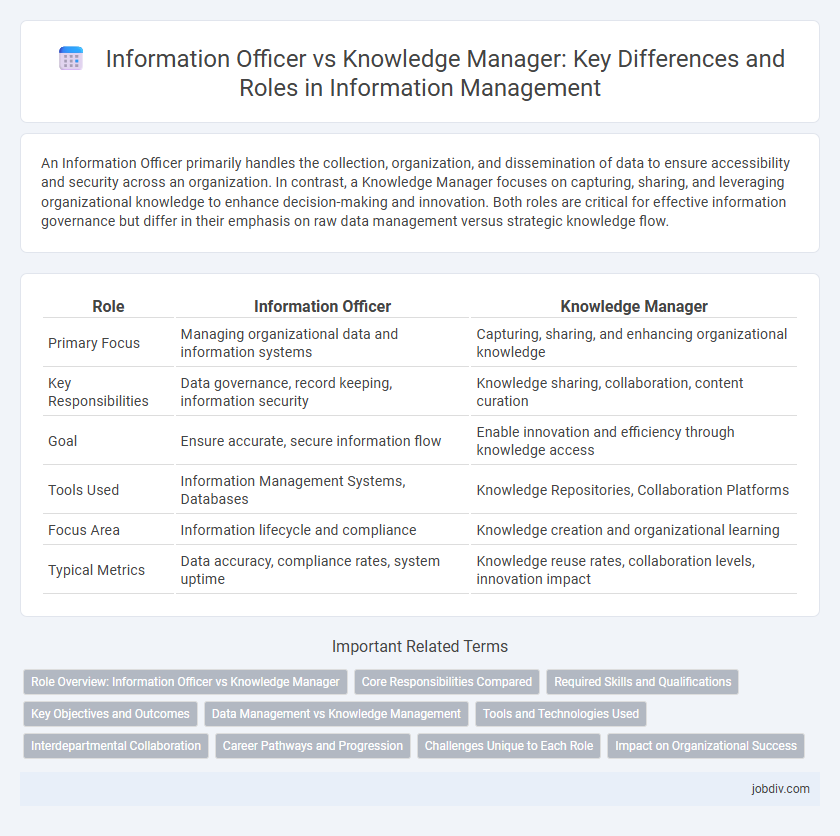An Information Officer primarily handles the collection, organization, and dissemination of data to ensure accessibility and security across an organization. In contrast, a Knowledge Manager focuses on capturing, sharing, and leveraging organizational knowledge to enhance decision-making and innovation. Both roles are critical for effective information governance but differ in their emphasis on raw data management versus strategic knowledge flow.
Table of Comparison
| Role | Information Officer | Knowledge Manager |
|---|---|---|
| Primary Focus | Managing organizational data and information systems | Capturing, sharing, and enhancing organizational knowledge |
| Key Responsibilities | Data governance, record keeping, information security | Knowledge sharing, collaboration, content curation |
| Goal | Ensure accurate, secure information flow | Enable innovation and efficiency through knowledge access |
| Tools Used | Information Management Systems, Databases | Knowledge Repositories, Collaboration Platforms |
| Focus Area | Information lifecycle and compliance | Knowledge creation and organizational learning |
| Typical Metrics | Data accuracy, compliance rates, system uptime | Knowledge reuse rates, collaboration levels, innovation impact |
Role Overview: Information Officer vs Knowledge Manager
Information Officers focus on managing, organizing, and securing data within an organization by overseeing information systems and ensuring compliance with data policies. Knowledge Managers specialize in capturing, distributing, and effectively utilizing organizational knowledge to enhance decision-making and innovation. Both roles are crucial, with Information Officers emphasizing data integrity and security, while Knowledge Managers drive knowledge sharing and organizational learning.
Core Responsibilities Compared
Information Officers specialize in managing data accuracy, security, and distribution within an organization to ensure reliable information flow. Knowledge Managers focus on capturing, organizing, and sharing organizational knowledge to enhance decision-making and innovation. Both roles collaborate to align information governance with knowledge strategies for improved organizational performance.
Required Skills and Qualifications
An Information Officer requires strong skills in data management, information systems, and regulatory compliance, often holding degrees in information science, IT, or library science. A Knowledge Manager focuses on expertise in knowledge sharing, organizational learning, and strategic information flow, typically requiring backgrounds in knowledge management, business administration, or communication. Both roles demand proficiency in digital tools, analytical thinking, and excellent communication abilities to manage and disseminate information effectively.
Key Objectives and Outcomes
Information Officers primarily focus on the accurate collection, management, and dissemination of organizational data to ensure compliance, security, and accessibility. Knowledge Managers emphasize creating, sharing, and leveraging intellectual assets to enhance collaboration, innovation, and decision-making across teams. Both roles aim to optimize information flow but differ in scope: Information Officers prioritize data integrity and control, while Knowledge Managers drive organizational learning and value creation through effective knowledge utilization.
Data Management vs Knowledge Management
Information Officers specialize in data management by organizing, storing, and securing structured data to ensure accessibility and compliance with regulatory standards. Knowledge Managers focus on knowledge management by capturing, sharing, and leveraging tacit and explicit knowledge within an organization to enhance decision-making and innovation. Data management emphasizes accuracy, consistency, and governance of data assets, while knowledge management prioritizes collaboration, learning, and intellectual capital development.
Tools and Technologies Used
Information Officers utilize data management systems, document management software, and enterprise content management platforms to organize and disseminate information efficiently. Knowledge Managers employ collaboration tools, knowledge bases, and artificial intelligence-driven knowledge discovery technologies to capture, share, and leverage organizational knowledge. Both roles increasingly integrate cloud computing and analytics software to enhance information accessibility and decision-making processes.
Interdepartmental Collaboration
Information Officers facilitate interdepartmental collaboration by ensuring accurate data dissemination and aligning communication protocols across departments. Knowledge Managers enhance collaboration through centralized knowledge repositories and workflows that enable seamless information sharing and collective problem-solving. Both roles are crucial for optimizing organizational efficiency by leveraging shared information assets and promoting cross-functional teamwork.
Career Pathways and Progression
Information Officers typically focus on managing data collection, storage, and dissemination within organizations, while Knowledge Managers specialize in optimizing knowledge sharing and organizational learning processes. Career progression for Information Officers often leads to roles like Data Analyst, Information Systems Manager, or Chief Information Officer, emphasizing technical data management skills. Knowledge Managers advance towards positions such as Knowledge Strategist, Chief Knowledge Officer, or Organizational Development Director, highlighting expertise in collaboration, innovation, and knowledge culture enhancement.
Challenges Unique to Each Role
Information Officers face challenges in ensuring data accuracy, managing compliance with privacy regulations, and safeguarding information security across organizational systems. Knowledge Managers struggle with capturing tacit knowledge, fostering a culture of knowledge sharing, and implementing effective collaboration tools to maintain organizational learning. Both roles require strategic alignment but address distinctly different aspects of information lifecycle management.
Impact on Organizational Success
Information Officers streamline data collection and ensure accurate information flow, enhancing decision-making efficiency and operational clarity within organizations. Knowledge Managers cultivate organizational learning by managing knowledge assets and facilitating knowledge sharing, thereby driving innovation and sustaining competitive advantage. Together, these roles optimize organizational success by aligning information accuracy with knowledge utilization.
Information Officer vs Knowledge Manager Infographic

 jobdiv.com
jobdiv.com